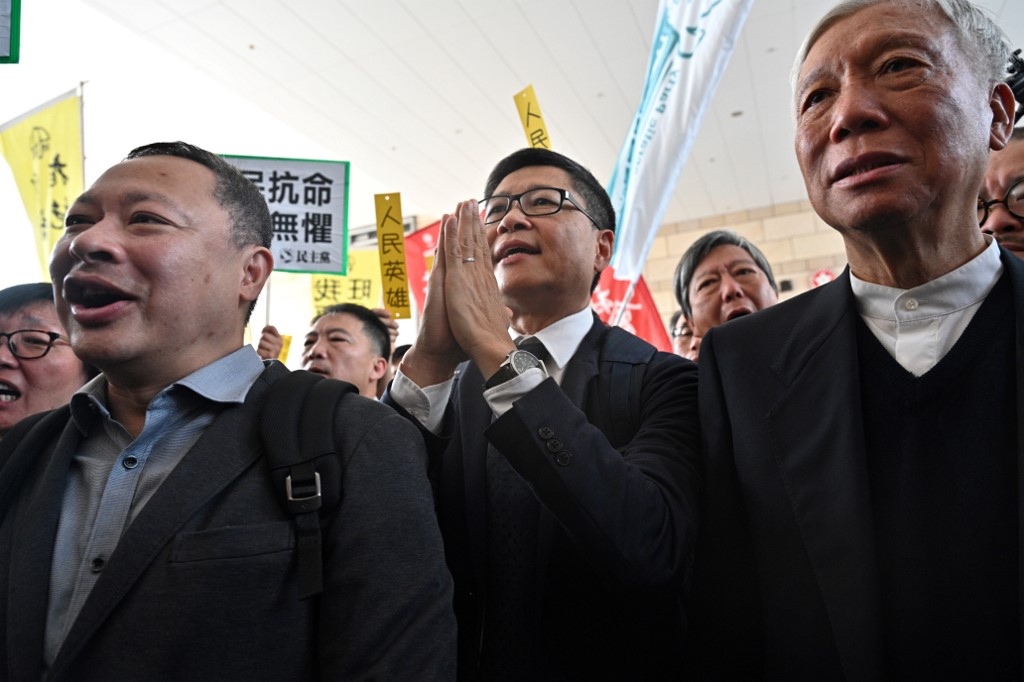A group of Hong Kong democracy leaders were found guilty on Tuesday for their involvement in mass rallies at a trial that sparked renewed alarm over shrinking political freedoms under an assertive China.
Nine activists were all convicted of at least one charge in a prosecution that deployed rarely-used colonial-era public nuisance laws over their participation in the 2014 Umbrella Movement protests, which called for free elections for the city’s leader.
Among the most prominent members of the group on trial were sociology professor Chan Kin-man, 60, law professor Benny Tai, 54, and Baptist minister Chu Yiu-ming, 75.
All now face jail.
The trio founded the pro-democracy “Occupy Central” movement in 2013, and a year later joined the student-led Umbrella Movement that brought parts of the city to a standstill for months.
All three were found guilty of conspiracy to commit public nuisance. Tai and Chan were also convicted of incitement to commit public nuisance, although all three were acquitted of incitement to incite public nuisance.
Of the remaining six defendants — a group of younger protest leaders, including two sitting lawmakers — five were convicted of two public nuisance charges, while one was convicted of the sole charge he faced.
Prosecutors opted to try the group under Hong Kong’s common law system, which carries a steeper sentence than statutory public nuisance laws — meaning each protest leader now faces a maximum penalty of up to seven years in jail.
In his verdict, Judge Johnny Chan ruled that the 2014 protests, which took over key intersections of the city for many weeks, were not protected by Hong Kong’s free speech laws.
“The unreasonableness of the obstruction was such that the significant and protected right to demonstrate should be displaced,” he said. “The act was one not warranted by law.”
After the verdicts were read out, the court was adjourned until the afternoon. It is not yet clear when the group will be sentenced.
Human rights groups and critics hit out at the convictions, saying the use of vaguely worded public nuisance laws against protesters would have a chilling effect on free speech in Hong Kong.
“Hong Kong courts, by labeling peaceful protests in pursuit of rights as public nuisance, are sending a terrible message that will likely embolden the government to prosecute more peaceful activists,” said Maya Wang, a senior China researcher at Human Rights Watch.
Chris Patten, the last British Governor of Hong Kong, said it was “appallingly divisive to use anachronistic common law charges in a vengeful pursuit of political events which took place in 2014.”
Before their conviction, the nine defendants struck a note of defiance as they greeted a large crowd of supporters outside the courthouse in Hong Kong’s Kowloon district on Tuesday morning.
“No matter what happens today, I have the confidence many people today will be together and continue to strive for Hong Kong democracy. We will persist on and do not give up,” Tai told media and supporters.
“I still believe in the power of love and peace. I have no regret for what I have done,” Chan Kin-man added.
The city enjoys rights unseen on the Chinese mainland, which are protected by the 50-year handover agreement between Britain and China, but fears are growing that those liberties are being eroded as Beijing flexes its muscles.
At the trial, prosecutors argued that the mass protests had caused a “common injury done to the public,” who had been affected by the blockage of major roads, and that the leaders of the movement deserved to be punished.
Judge Chan denied his ruling would impact the ability of Hong Kongers to protest.
“It cannot be reasonably argued that a charge of conspiracy to cause public nuisance would generate a chilling effect in society,” he wrote.
The Occupy movement highlighted widespread frustration, especially among the young, over Hong Kong’s direction, but failed to win any reforms or concessions from Beijing.
Since then, many activists have been prosecuted, with some jailed, while a string of pro-democracy lawmakers have been barred from taking office.





Reader Interactions